Administration Law: Accessing Government Information and Acts
VerifiedAdded on 2020/06/06
|6
|1344
|138
Homework Assignment
AI Summary
This assignment delves into the realm of Australian administration law, specifically addressing the Information Act 1982 and its implications for accessing government documents. It highlights the role of the Australian Information Commissioner Act 2010 and the establishment of the Office of Australian Information Commissioner (OAIC), outlining their responsibilities in freedom of information, privacy, and information policy. The assignment explains the interplay between the Freedom of Information Act 1922 and the Privacy Act 1988, detailing the OAIC's functions, including handling complaints, conducting investigations, and reviewing decisions. It further elaborates on the rights of individuals to access information, the concept of exempt documents, and relevant factors influencing information access, referencing the Dreyfus and Attorney-General case. The assignment concludes by providing a list of references including books and journals related to the topic.
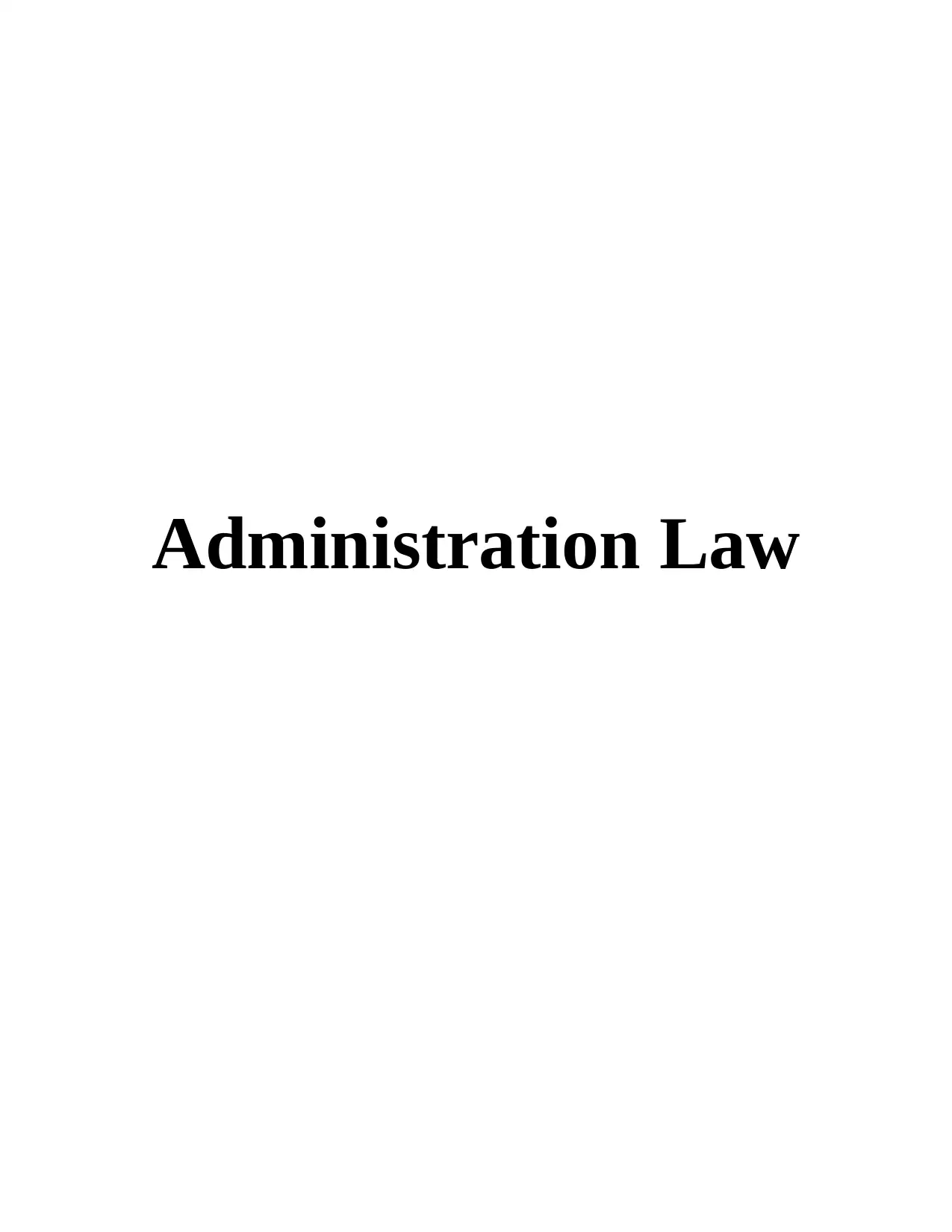
Administration Law
Paraphrase This Document
Need a fresh take? Get an instant paraphrase of this document with our AI Paraphraser

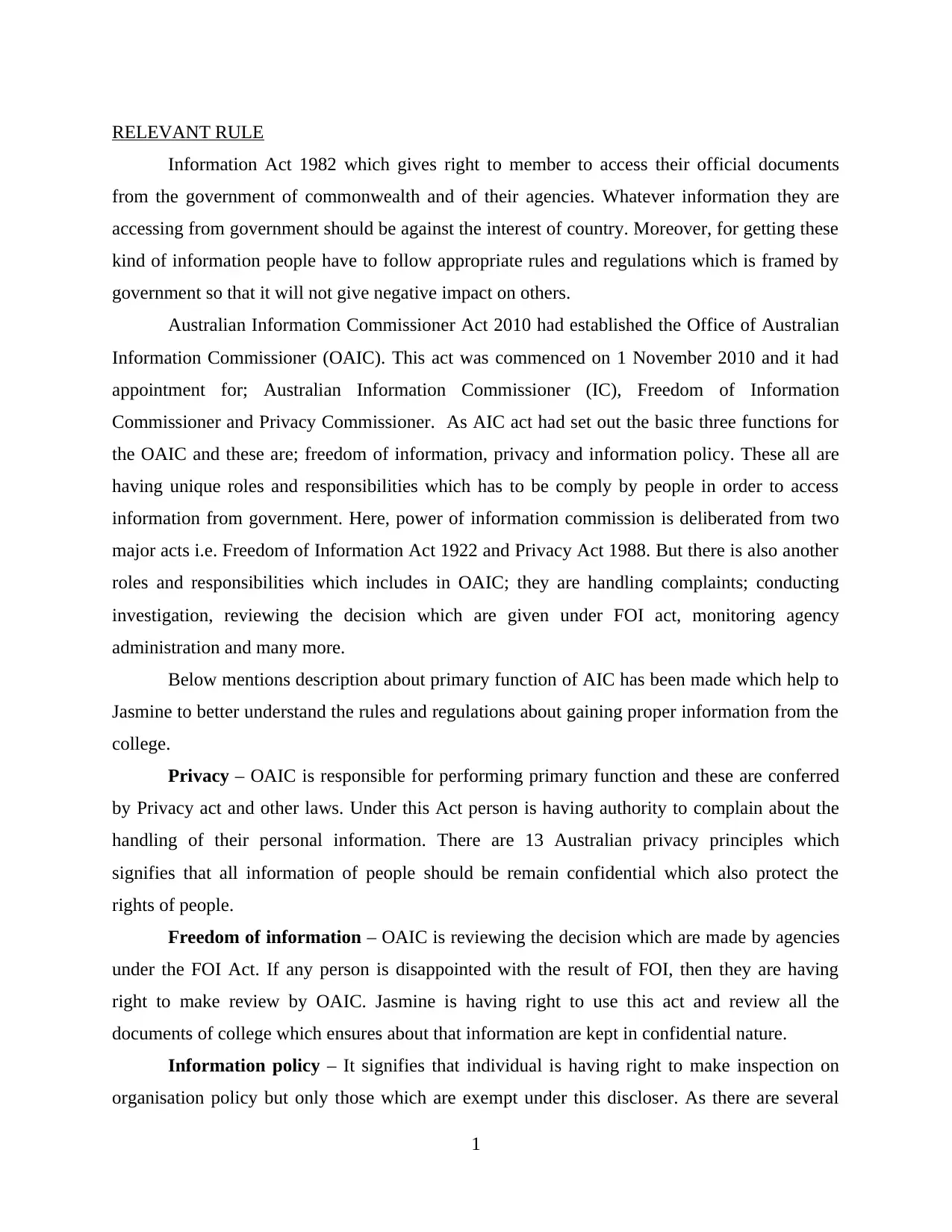
RELEVANT RULE
Information Act 1982 which gives right to member to access their official documents
from the government of commonwealth and of their agencies. Whatever information they are
accessing from government should be against the interest of country. Moreover, for getting these
kind of information people have to follow appropriate rules and regulations which is framed by
government so that it will not give negative impact on others.
Australian Information Commissioner Act 2010 had established the Office of Australian
Information Commissioner (OAIC). This act was commenced on 1 November 2010 and it had
appointment for; Australian Information Commissioner (IC), Freedom of Information
Commissioner and Privacy Commissioner. As AIC act had set out the basic three functions for
the OAIC and these are; freedom of information, privacy and information policy. These all are
having unique roles and responsibilities which has to be comply by people in order to access
information from government. Here, power of information commission is deliberated from two
major acts i.e. Freedom of Information Act 1922 and Privacy Act 1988. But there is also another
roles and responsibilities which includes in OAIC; they are handling complaints; conducting
investigation, reviewing the decision which are given under FOI act, monitoring agency
administration and many more.
Below mentions description about primary function of AIC has been made which help to
Jasmine to better understand the rules and regulations about gaining proper information from the
college.
Privacy – OAIC is responsible for performing primary function and these are conferred
by Privacy act and other laws. Under this Act person is having authority to complain about the
handling of their personal information. There are 13 Australian privacy principles which
signifies that all information of people should be remain confidential which also protect the
rights of people.
Freedom of information – OAIC is reviewing the decision which are made by agencies
under the FOI Act. If any person is disappointed with the result of FOI, then they are having
right to make review by OAIC. Jasmine is having right to use this act and review all the
documents of college which ensures about that information are kept in confidential nature.
Information policy – It signifies that individual is having right to make inspection on
organisation policy but only those which are exempt under this discloser. As there are several
1
Information Act 1982 which gives right to member to access their official documents
from the government of commonwealth and of their agencies. Whatever information they are
accessing from government should be against the interest of country. Moreover, for getting these
kind of information people have to follow appropriate rules and regulations which is framed by
government so that it will not give negative impact on others.
Australian Information Commissioner Act 2010 had established the Office of Australian
Information Commissioner (OAIC). This act was commenced on 1 November 2010 and it had
appointment for; Australian Information Commissioner (IC), Freedom of Information
Commissioner and Privacy Commissioner. As AIC act had set out the basic three functions for
the OAIC and these are; freedom of information, privacy and information policy. These all are
having unique roles and responsibilities which has to be comply by people in order to access
information from government. Here, power of information commission is deliberated from two
major acts i.e. Freedom of Information Act 1922 and Privacy Act 1988. But there is also another
roles and responsibilities which includes in OAIC; they are handling complaints; conducting
investigation, reviewing the decision which are given under FOI act, monitoring agency
administration and many more.
Below mentions description about primary function of AIC has been made which help to
Jasmine to better understand the rules and regulations about gaining proper information from the
college.
Privacy – OAIC is responsible for performing primary function and these are conferred
by Privacy act and other laws. Under this Act person is having authority to complain about the
handling of their personal information. There are 13 Australian privacy principles which
signifies that all information of people should be remain confidential which also protect the
rights of people.
Freedom of information – OAIC is reviewing the decision which are made by agencies
under the FOI Act. If any person is disappointed with the result of FOI, then they are having
right to make review by OAIC. Jasmine is having right to use this act and review all the
documents of college which ensures about that information are kept in confidential nature.
Information policy – It signifies that individual is having right to make inspection on
organisation policy but only those which are exempt under this discloser. As there are several
1
⊘ This is a preview!⊘
Do you want full access?
Subscribe today to unlock all pages.

Trusted by 1+ million students worldwide
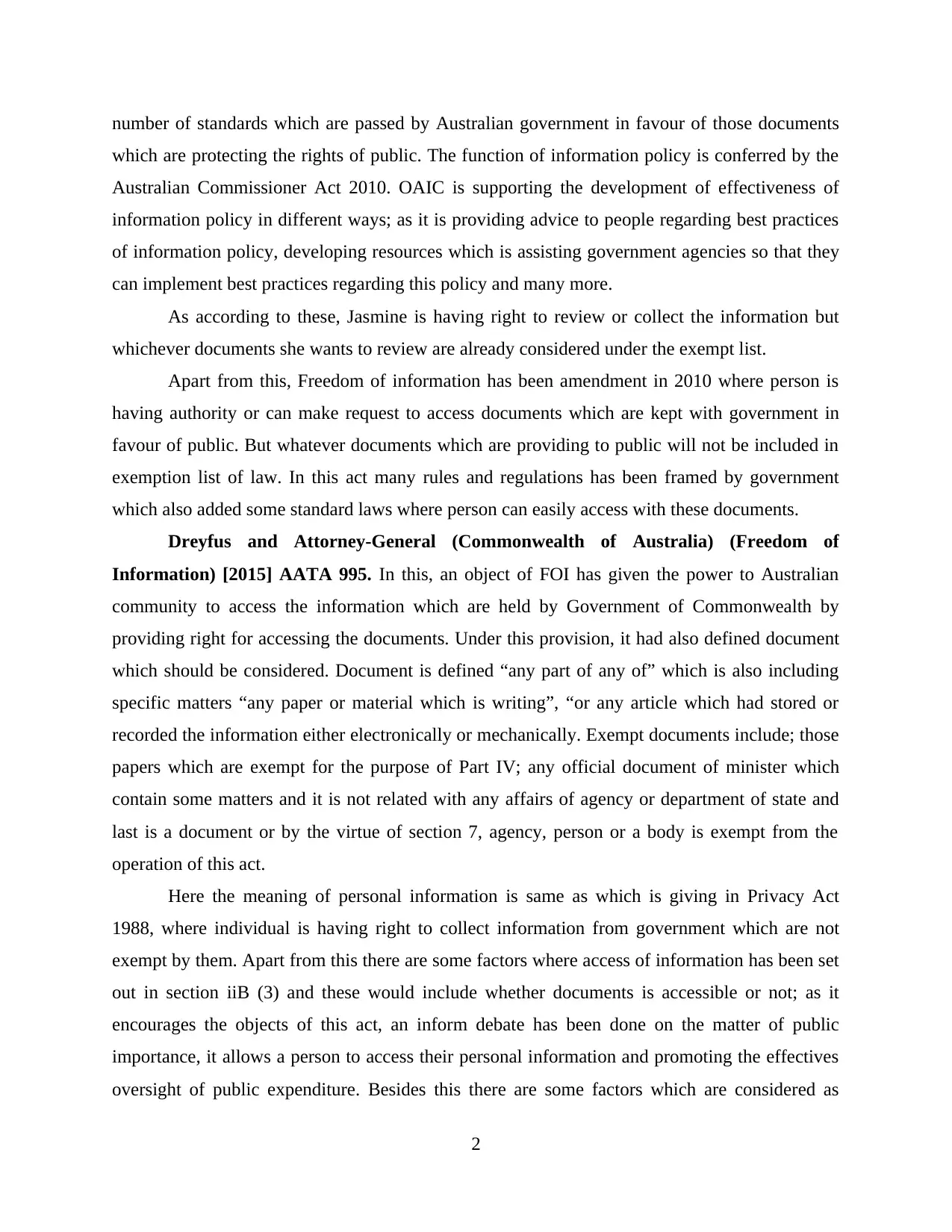
number of standards which are passed by Australian government in favour of those documents
which are protecting the rights of public. The function of information policy is conferred by the
Australian Commissioner Act 2010. OAIC is supporting the development of effectiveness of
information policy in different ways; as it is providing advice to people regarding best practices
of information policy, developing resources which is assisting government agencies so that they
can implement best practices regarding this policy and many more.
As according to these, Jasmine is having right to review or collect the information but
whichever documents she wants to review are already considered under the exempt list.
Apart from this, Freedom of information has been amendment in 2010 where person is
having authority or can make request to access documents which are kept with government in
favour of public. But whatever documents which are providing to public will not be included in
exemption list of law. In this act many rules and regulations has been framed by government
which also added some standard laws where person can easily access with these documents.
Dreyfus and Attorney-General (Commonwealth of Australia) (Freedom of
Information) [2015] AATA 995. In this, an object of FOI has given the power to Australian
community to access the information which are held by Government of Commonwealth by
providing right for accessing the documents. Under this provision, it had also defined document
which should be considered. Document is defined “any part of any of” which is also including
specific matters “any paper or material which is writing”, “or any article which had stored or
recorded the information either electronically or mechanically. Exempt documents include; those
papers which are exempt for the purpose of Part IV; any official document of minister which
contain some matters and it is not related with any affairs of agency or department of state and
last is a document or by the virtue of section 7, agency, person or a body is exempt from the
operation of this act.
Here the meaning of personal information is same as which is giving in Privacy Act
1988, where individual is having right to collect information from government which are not
exempt by them. Apart from this there are some factors where access of information has been set
out in section iiB (3) and these would include whether documents is accessible or not; as it
encourages the objects of this act, an inform debate has been done on the matter of public
importance, it allows a person to access their personal information and promoting the effectives
oversight of public expenditure. Besides this there are some factors which are considered as
2
which are protecting the rights of public. The function of information policy is conferred by the
Australian Commissioner Act 2010. OAIC is supporting the development of effectiveness of
information policy in different ways; as it is providing advice to people regarding best practices
of information policy, developing resources which is assisting government agencies so that they
can implement best practices regarding this policy and many more.
As according to these, Jasmine is having right to review or collect the information but
whichever documents she wants to review are already considered under the exempt list.
Apart from this, Freedom of information has been amendment in 2010 where person is
having authority or can make request to access documents which are kept with government in
favour of public. But whatever documents which are providing to public will not be included in
exemption list of law. In this act many rules and regulations has been framed by government
which also added some standard laws where person can easily access with these documents.
Dreyfus and Attorney-General (Commonwealth of Australia) (Freedom of
Information) [2015] AATA 995. In this, an object of FOI has given the power to Australian
community to access the information which are held by Government of Commonwealth by
providing right for accessing the documents. Under this provision, it had also defined document
which should be considered. Document is defined “any part of any of” which is also including
specific matters “any paper or material which is writing”, “or any article which had stored or
recorded the information either electronically or mechanically. Exempt documents include; those
papers which are exempt for the purpose of Part IV; any official document of minister which
contain some matters and it is not related with any affairs of agency or department of state and
last is a document or by the virtue of section 7, agency, person or a body is exempt from the
operation of this act.
Here the meaning of personal information is same as which is giving in Privacy Act
1988, where individual is having right to collect information from government which are not
exempt by them. Apart from this there are some factors where access of information has been set
out in section iiB (3) and these would include whether documents is accessible or not; as it
encourages the objects of this act, an inform debate has been done on the matter of public
importance, it allows a person to access their personal information and promoting the effectives
oversight of public expenditure. Besides this there are some factors which are considered as
2
Paraphrase This Document
Need a fresh take? Get an instant paraphrase of this document with our AI Paraphraser
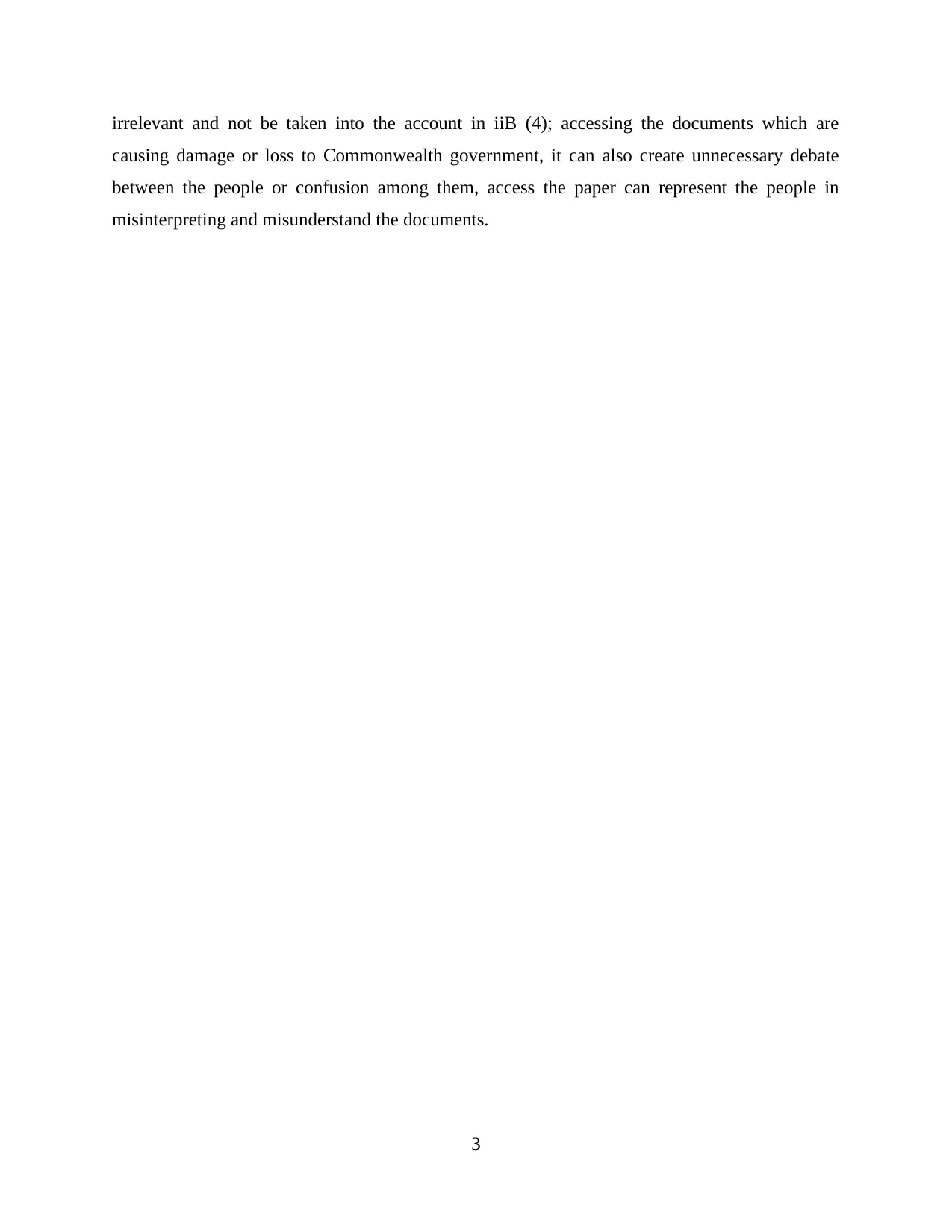
irrelevant and not be taken into the account in iiB (4); accessing the documents which are
causing damage or loss to Commonwealth government, it can also create unnecessary debate
between the people or confusion among them, access the paper can represent the people in
misinterpreting and misunderstand the documents.
3
causing damage or loss to Commonwealth government, it can also create unnecessary debate
between the people or confusion among them, access the paper can represent the people in
misinterpreting and misunderstand the documents.
3
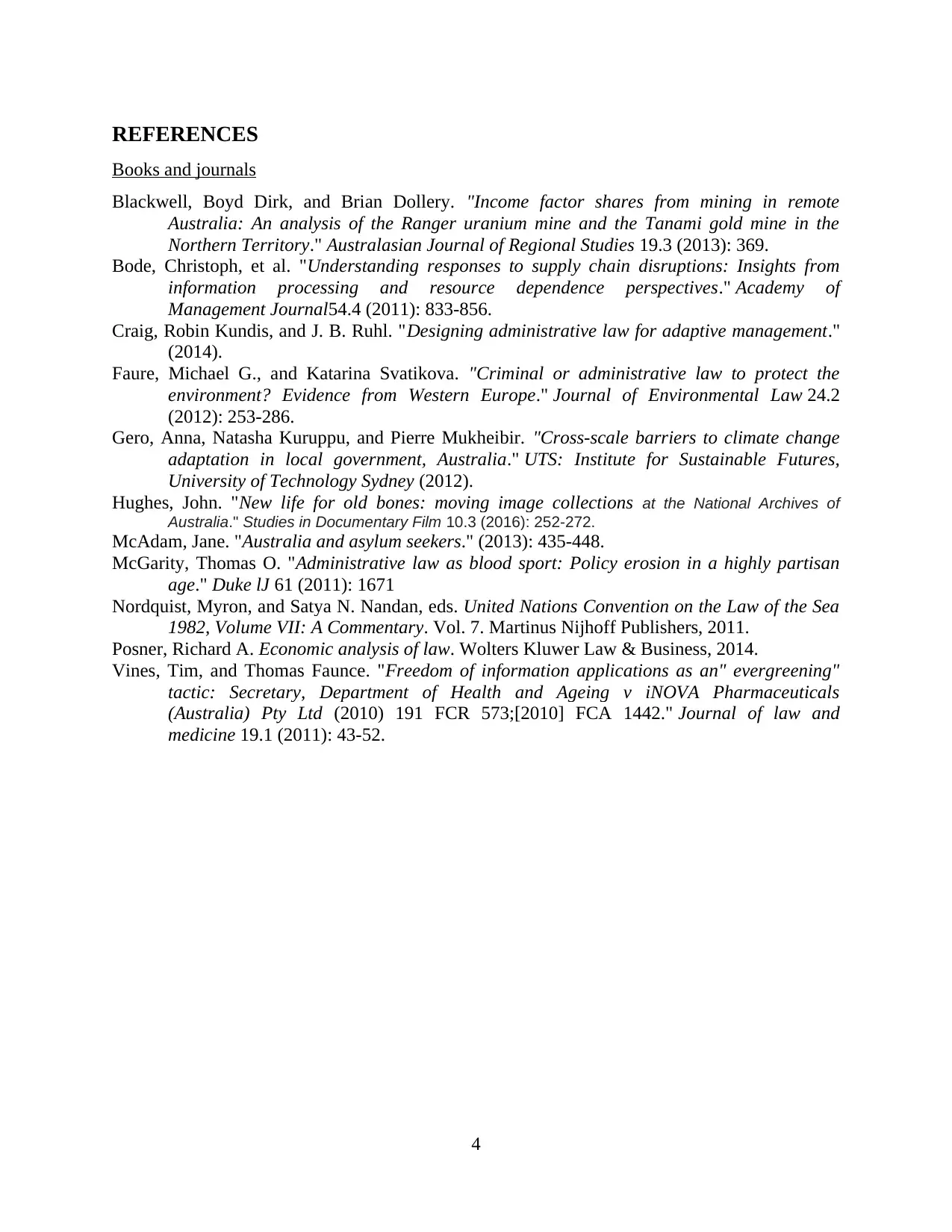
REFERENCES
Books and journals
Blackwell, Boyd Dirk, and Brian Dollery. "Income factor shares from mining in remote
Australia: An analysis of the Ranger uranium mine and the Tanami gold mine in the
Northern Territory." Australasian Journal of Regional Studies 19.3 (2013): 369.
Bode, Christoph, et al. "Understanding responses to supply chain disruptions: Insights from
information processing and resource dependence perspectives." Academy of
Management Journal54.4 (2011): 833-856.
Craig, Robin Kundis, and J. B. Ruhl. "Designing administrative law for adaptive management."
(2014).
Faure, Michael G., and Katarina Svatikova. "Criminal or administrative law to protect the
environment? Evidence from Western Europe." Journal of Environmental Law 24.2
(2012): 253-286.
Gero, Anna, Natasha Kuruppu, and Pierre Mukheibir. "Cross-scale barriers to climate change
adaptation in local government, Australia." UTS: Institute for Sustainable Futures,
University of Technology Sydney (2012).
Hughes, John. "New life for old bones: moving image collections at the National Archives of
Australia." Studies in Documentary Film 10.3 (2016): 252-272.
McAdam, Jane. "Australia and asylum seekers." (2013): 435-448.
McGarity, Thomas O. "Administrative law as blood sport: Policy erosion in a highly partisan
age." Duke lJ 61 (2011): 1671
Nordquist, Myron, and Satya N. Nandan, eds. United Nations Convention on the Law of the Sea
1982, Volume VII: A Commentary. Vol. 7. Martinus Nijhoff Publishers, 2011.
Posner, Richard A. Economic analysis of law. Wolters Kluwer Law & Business, 2014.
Vines, Tim, and Thomas Faunce. "Freedom of information applications as an" evergreening"
tactic: Secretary, Department of Health and Ageing v iNOVA Pharmaceuticals
(Australia) Pty Ltd (2010) 191 FCR 573;[2010] FCA 1442." Journal of law and
medicine 19.1 (2011): 43-52.
4
Books and journals
Blackwell, Boyd Dirk, and Brian Dollery. "Income factor shares from mining in remote
Australia: An analysis of the Ranger uranium mine and the Tanami gold mine in the
Northern Territory." Australasian Journal of Regional Studies 19.3 (2013): 369.
Bode, Christoph, et al. "Understanding responses to supply chain disruptions: Insights from
information processing and resource dependence perspectives." Academy of
Management Journal54.4 (2011): 833-856.
Craig, Robin Kundis, and J. B. Ruhl. "Designing administrative law for adaptive management."
(2014).
Faure, Michael G., and Katarina Svatikova. "Criminal or administrative law to protect the
environment? Evidence from Western Europe." Journal of Environmental Law 24.2
(2012): 253-286.
Gero, Anna, Natasha Kuruppu, and Pierre Mukheibir. "Cross-scale barriers to climate change
adaptation in local government, Australia." UTS: Institute for Sustainable Futures,
University of Technology Sydney (2012).
Hughes, John. "New life for old bones: moving image collections at the National Archives of
Australia." Studies in Documentary Film 10.3 (2016): 252-272.
McAdam, Jane. "Australia and asylum seekers." (2013): 435-448.
McGarity, Thomas O. "Administrative law as blood sport: Policy erosion in a highly partisan
age." Duke lJ 61 (2011): 1671
Nordquist, Myron, and Satya N. Nandan, eds. United Nations Convention on the Law of the Sea
1982, Volume VII: A Commentary. Vol. 7. Martinus Nijhoff Publishers, 2011.
Posner, Richard A. Economic analysis of law. Wolters Kluwer Law & Business, 2014.
Vines, Tim, and Thomas Faunce. "Freedom of information applications as an" evergreening"
tactic: Secretary, Department of Health and Ageing v iNOVA Pharmaceuticals
(Australia) Pty Ltd (2010) 191 FCR 573;[2010] FCA 1442." Journal of law and
medicine 19.1 (2011): 43-52.
4
⊘ This is a preview!⊘
Do you want full access?
Subscribe today to unlock all pages.

Trusted by 1+ million students worldwide
1 out of 6
Related Documents
Your All-in-One AI-Powered Toolkit for Academic Success.
+13062052269
info@desklib.com
Available 24*7 on WhatsApp / Email
![[object Object]](/_next/static/media/star-bottom.7253800d.svg)
Unlock your academic potential
Copyright © 2020–2026 A2Z Services. All Rights Reserved. Developed and managed by ZUCOL.





